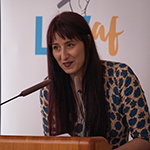The Body
I gave birth to a son and dreaded his nature,
bore holes in plates,
day after day I overspilled meals with prayers
Converted, bone by bone loudly
slipped out of some other god’s fist
You hear me? My son will never set a cat on fire
Still a cat is merely a structure of agility,
nothing in her paws drives the day
at least not enough for her to survive the last war
Irradiated she’ll grow three heads
and her kittens will glow like bulbs
Filled with radioactive meaning
she’ll be a predator lurking from a distance,
a tenderness that yields a slow death
The neighborhood boys will light cat tails like firecrackers,
shove the firecrackers in cats’ anuses watching as their guts
outshine the spring explosions of flowers
The blazing cats will come jumping into our beds
like Molotov cocktails
for the final cuddle
In days to come, closing their eyes to the nature of boys,
all the neighborhood women will burn like the cats
I don’t understand why you get so distrustful
You know I bore us a son bold enough
to turn into a girl
when you’re not looking
She must’ve grown up that day
the puss put on the boots,
took away the clarity of her sex
There was nothing to be done
The Antibody
This borrowed body is
A skyscraper surprised by the persistence of doves,
off its façade flakes the brushing of neighbors,
in the heart of the elevator
the bill collector had a sudden sympathy attack
We’ve given up defining love as a newborn,
aware we could easily be fooled by a cactus of similar shape
Our mothers, all excelling in motherhood,
said the emptiness had to do
with my perception of reality
as the volume of a poem
Said it certainly had nothing to do with you
I’ve been diagnosed with an abyss
In the park I sit calling out to imaginary girls
They already talk like grownups
and when they ask me mommy why have you been crying,
I tell them frankly
that indifference is
the first degree of dying,
and we are alive, so alive
What I don’t tell them is that I’ve already forgotten
how old they are,
all about their childhood crushes
I don’t tell them that in your presence
I never utter
their unborn names
Translator’s Note:
In 1959, in her poetry collection Nestvarne djevojčice (Imaginary Girls), Marija Čudina wrote: “giving birth to little sufferers is a divine duty / of all women, of the young ones and girls even / but let them beware once they deliver / not to find themselves rejoicing by the window […] for it is of grave importance that a child cries once presented / with the mad forest that echoes with the pounding of fists / and that it be miserable coming to know the world / and the true pain leaving the body at night in vapor.”
Writing in a time when existentialism dominated poetry in Croatian and Yugoslav literature, Čudina was conscious of the societal restrictions posed on bodies, almost as a force against which there is no recourse. More than a half century later, Monika Herceg grapples with the same norm-imposing structures in her writing. The first poem presented here, “The Body,” opens with a vivid expression of the subject’s anxiety as it projects onto the newborn child the gender norms of masculinity, which culminates in the abrupt and decisive statement: “My son will never set a cat on fire” even at the price of renouncing any ‘higher’ authority, in this case symbolized by the unnamed ‘god.’
Throughout Herceg’s collection, Lovostaj. (Closed Season.), femininity takes various symbolic forms. In this case, cats represent a “structure of agility” adaptable to the conditions set by the masculine power structures which have systematically removed them from dominant discourses, be they social, political, medical etc., and thus have accumulated “radioactive meaning,” which becomes slowly released, or “a tenderness that yields a slow death.” The feminine/masculine contrast persists throughout the poem, most strikingly in the image: “The neighborhood boys will light cat tails like firecrackers, / shove the firecrackers in cats’ anuses watching as their guts / outshine the spring explosions of flowers.” Ultimately, the ‘son’ is bold enough to metamorphosize into a ‘girl’ and there is nothing ‘patriarchy’, embodied in the ‘father’, can do about it. By exploring the bodily transformations in this vein, the poem resonates quite well with Carol Ann Duffy’s “Mrs Tiresias.”
And while “The Body” subverts the necessity of bearing a male child, rooted in European aristocratic traditions, “The Antibody” is its antithesis: the inability of woman to conceive at all, or possibly, a terminated pregnancy. The layering of female experiences with regards to traditional gender roles is what Herceg often aims at, implying there is no single nor fixed definition of what it means to be woman and challenging the romanticized images of motherhood rooted in patriarchal representations in literature of Western societies. Subsequently, what gives the human body significance varies across temporal and spatial contexts, and poetry, with its marginal position among other political discourses, is a place of endless possibilities for exercising subversive power and challenging the dominant norms.

Monika Herceg is a Croatian poet, playwright, and editor at Fraktura Publishing and Poezija, a poetry journal published by the Croatian Writers’ Society. She is the author of three poetry collections, including Početne Koordinate (Initial Coordinates, SKUD Ivan Goran Kovačić, 2018; Sandorf Passage, 2022), Lovostaj. (Closed Season., Jesenski & Turk, 2019), and Vrijeme prije jezika (The Time Before the Tongue, Fraktura, 2020). Her work has been recognized through many awards and honors, most notable of which are the Goran Award for Young Poets, the Fran Galović Prize, and the Macedonian Bridges of Struga Award, and translated into more than fifteen languages, among them English, French, Italian, Greek, and German. She is the 2024 European Poet of Freedom laureate, juried, among others, by the Nobel laureate Olga Tokarczuk.. moherceg.wordpress.com.

Marina Veverec (Đakovo, 1995) studied literary translation at the University of Zadar, Croatia, and is also an alumnus of the BCLT Summer School. Her translations have appeared in [sic], Denver Quarterly, Exchanges, Poetry International Web, Asymptote, VerseVille, Literary Hub, and Harvard Review. In 2022, her translation of Monika Herceg’s Initial Coordinates was published by Sandorf Passage. She lives in Zadar where she co-organizes the LITaf Literary Festival and holds the role of a language editor at [sic] – a Journal of Literature, Culture and Literary Translation, as well as at SPONDE. She works as a special education paraprofessional at a local elementary school.

 BACK TO ISSUE
BACK TO ISSUE